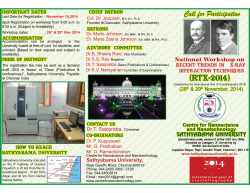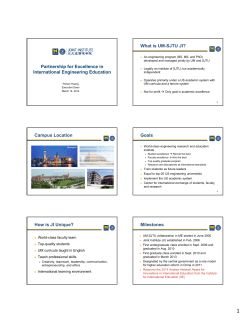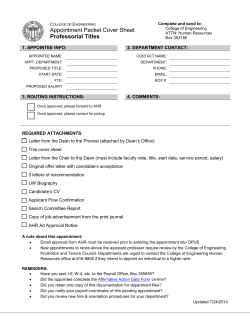
Dean of the Weinberg College of Arts and Sciences Leadership Profile
Dean of the Weinberg College of Arts and Sciences Leadership Profile Prepared by Jean Dowdall, Ph.D. Dennis M. Barden Elizabeth K. Bohan and the WCAS Dean Search Committee Fall 2014 This leadership profile is intended to provide information about Northwestern University and the position of Dean of the Weinberg College of Arts and Sciences. It is designed to assist qualified individuals in assessing their interest in this position. The Opportunity Northwestern University invites inquiries, nominations, and applications for the position of dean of the Judd A. and Marjorie Weinberg College of Arts and Sciences (WCAS). The College constitutes the liberal arts core of a multifaceted AAU research university that has a distinguished and distinctive interdisciplinary tradition. Northwestern University is global in its scope, with 12 schools and colleges located on two campuses in Illinois (in Evanston and in Chicago) and one situated in Doha, Qatar. Ranked 12th among national universities by U.S. News, Northwestern has approximately 3,800 full-time faculty. The University’s total enrollment is just over 16,000, with undergraduates comprising just over half of that number. Weinberg is not only the largest of Northwestern’s undergraduate schools but also the school with the most Ph.D. students. There are 4,300 undergraduate students, 1,300 graduate students, and 600 full-time faculty members in the Weinberg community. The College is made up of 26 departments and as many specialized programs, intersecting with every part of the University and enrolling students from all of Northwestern’s undergraduate schools. The dean’s primary responsibilities are to foster a vibrant intellectual community that values analysis and innovation, critical thought, and creative expression; lead WCAS in articulating the College’s strategic priorities; increase the resources essential to sustaining and shaping the College; maintain the excellence of academic programs; and oversee and enhance the management of the College. The new dean will be a tenured full professor with an international reputation as a distinguished scholar, an inspiring intellectual vision, and strong academic leadership and management experience. Additional information about Northwestern is available at www.northwestern.edu; information about WCAS may be found at www.weinberg.northwestern.edu. Information for those who wish to be candidates for the position is available at the end of this document. 1 The Role of the Dean The dean of Weinberg is the intellectual leader of the College and a key member of the University leadership team. The new dean will have the opportunity to articulate a bold shared vision and to inspire others to participate in its implementation. The dean’s primary role is to ensure that Weinberg provides a rich academic environment that promotes excellence in undergraduate education, graduate student training, and faculty research. Specific responsibilities include: Developing the College’s strategic plan, raising money to support the priorities outlined in that plan, and allocating resources; Formulating an annual faculty hiring plan, reviewing recommendations for faculty offers, and extending offers to approved candidates; Presiding over the faculty tenure, promotion, and salary-setting committees, and making recommendations for approval to the provost and president; Representing the College within the University and to external communities; Cultivating close working relationships with faculty, students, and staff. Opportunities and Expectations for Leadership The new dean of Weinberg will be asked to undertake critical leadership tasks, including the following: Articulate a unifying vision: Champion the liberal arts both internally and externally, advocating for the arts and sciences as a core intellectual resource for the University. Energize faculty and students around a vision that reflects historically recognized as well as new modes of intellectual production and pedagogy. Build resources: Use creativity and leadership to secure resources to support the vision. Collaborate with senior university leaders and fundraise so as to ensure support for continued faculty excellence and undergraduate opportunities. Support diversity: Continue to realize Northwestern’s commitment to diversity and create supports systems for a diverse student body. Improve practices to recruit, retain, and support outstanding faculty who enhance both the diversity of the professoriate and the learning environment for all students. Lead through change: Encourage creativity and innovation in pedagogy, research, outreach, and administrative operations. Build mutually supportive relationships with central administration, deans, faculty members from WCAS and the other schools, students, and external supporters. Guide the exploration of new technologies for higher education. 2 Professional Qualifications and Personal Qualities The ideal candidate will have the following professional qualifications and personal qualities. Academic accomplishment and stature: International reputation as a distinguished scholar with a record of academic accomplishment appropriate to appointment as a tenured full professor in the College. Commitment to fulfilling Weinberg’s mission: Ability to inspire and lead a vibrant intellectual community that values analysis and innovation, critical thought, and creative expression. Skill in recruiting, retaining, and supporting outstanding faculty. Expertise in promoting quality undergraduate and graduate teaching. Understanding of the forces, opportunities, and challenges that have an impact on higher education: Knowledge of the complex economic, political and cultural issues being addressed by leaders across higher education in the United States and globally. Leadership: Ability to articulate ambitious and creative plans for the College in ways that inspire a broad community to solve problems, build consensus, and implement shared goals. Capacity for strategic thinking and formulation of new initiatives. Appreciation and enthusiasm for the extraordinary range of disciplines represented in the College. Ability to foster a culture of trust and fairness among chairs, directors and staff. Communication skills: Ability to advocate for the College’s priorities while working effectively with other deans and University senior leaders. Facility in representing faculty concerns to administration and administrative concerns to faculty. Management skills: Successful experience in leading and managing a complex organization, including the ability to shape and implement a plan, lead large-scale and cross-disciplinary projects, manage complex financial resources, and work effectively with colleagues and staff. Proven track record of being both decisive and inclusive. Capacity to develop essential resources: Ability to attract funds from private philanthropists, foundations, and corporations as well as eagerness to cultivate and solicit donors. Creativity in building revenue streams to support the College’s activities. Appreciation of distinctive groups within Weinberg: Awareness of the specific needs and contributions of tenure-line faculty, teaching-track faculty, graduate students, undergraduates, staff, and alumni. Recognition of the contributions and challenges faced by people from historically under-represented groups. Personal qualities: Wide-ranging intellectual curiosity and a commitment to shared governance and transparency. Appreciation for the expertise of others in making informed decisions. 3 The Weinberg College of Arts and Sciences Founded in 1851, Weinberg is the oldest, largest, and most comprehensive school in the University. Its departments and programs encompass the arts and humanities, foreign languages, mathematics and statistics, natural sciences, and social sciences. Weinberg houses 26 academic departments, which offer majors and minors in 45 fields. Faculty members are actively involved in research, undergraduate education, and graduate training. Most Weinberg departments, as well as many of its interdisciplinary programs, provide opportunities for graduate study. Northwestern ranks near the top among private universities in the number of Ph.D. degrees awarded annually. Detailed information about the College’s academic departments, academic programs, and centers and institutes may be found at http://www.weinberg.northwestern.edu/departments/in-depth/. Structure The dean plays a central role within a large collaborative team. Reporting to the dean are 26 department chairs and seven associate deans. The director of development for WCAS, who reports to the associate vice president of alumni relations and development, works closely with the dean. Three advisory boards provide input to the dean about the operations and goals of the College: the WCAS Board of Visitors (composed of 50 alumni leaders from across the country); the Student Advisory Board (comprised of undergraduate representatives from each of the majors); and the Staff Advisory Board. The dean reports to the provost, who will select and appoint the dean in consultation with the president. The organization chart is in Appendix I. Faculty Weinberg faculty members are internationally acclaimed for the quality of their research and teaching. They are recipients of more than $100 million in sponsored research support annually. In addition to mentoring 40 percent of the University’s Ph.D. students, they teach 67 percent of undergraduates University-wide. Recent honors include a Nobel Prize and several MacArthur Foundation “genius” awards, as well as memberships in the American Academy of Arts and Sciences and the National Academy of Sciences. The provost has signaled Northwestern’s investment in the College’s faculty by authorizing searches for 20 new positions in the 2014-15 academic year. In addition to 450 tenured or tenure-line faculty, Weinberg has 150 Professors of Instruction; in the past decade, Weinberg has put in place measures to make visible the contributions of these faculty, while also rationalizing systems for their recruitment and promotion. Undergraduate Students and Programs WCAS recruits, educates, and mentors a talented undergraduate student body of 4,300. Weinberg is highly selective; each year about 1,100 first-year students enter the College, chosen from over 20,000 applicants. These students come from all 50 states and more than 30 foreign countries. In 2013-14, Weinberg students received eight Fulbright Fellowships, three National Science Foundation Fellowships, and one Marshall Fellowship, along with numerous disciplinary scholarships. More than 30 percent of students complete a double major; 97 percent of entering students return for their sophomore year and 95 percent graduate from 4 Northwestern. More than 80 percent of Weinberg graduates eventually undertake graduate or professional study. Weinberg prides itself on preparing students for a lifetime of engagement through learning, research, and discovery. Students have the opportunity to conduct research through such programs as the Undergraduate Research Assistant Program and Undergraduate Research Grants Program. The College emphasizes leadership and character development through student participation in a wide range of extracurricular activities. Weinberg also offers students the opportunity to take applied courses through the University’s professional schools. Students are invited to explore the link between theory and practice, engage in experiential learning, and capitalize on the University’s proximity to Chicago. Each year, for instance, over 300 students pursue academically challenging internships through Chicago Field Studies. The College also sponsors professional linkage seminars taught by accomplished professionals from outside the University. Graduate Education 1,300 graduate students working toward Master’s and Ph.D. degrees constitute an essential part of Weinberg’s community of scholars. Through The Graduate School, WCAS faculty offer graduate degrees in over 30 areas of study. The Graduate School, which admits and funds students, sponsors an Interdisciplinary Cluster Initiative that facilitates connections between doctoral students and faculty from disparate departments and programs. Graduate students have recently received a number of prestigious awards, including a National Science Foundation Predoctoral Fellowship, National Defense Science & Engineering Graduate Fellowship, Charlotte W. Newcombe Doctoral Dissertation Fellowship, and NASA Earth and Space Science Fellowship. Research Research is a key component of Northwestern’s pioneering and innovative spirit. Much of the research in Weinberg involves building interdisciplinary research teams across departments, schools, and universities around the world. The Office for Sponsored Research works with the College to support over 90 school-based research centers and 26 University centers. Researchers connect to the community through strategic partnerships with institutions such as the Chicago Botanic Garden, Argonne National Laboratory, Adler Planetarium, Field Museum, and Fermilab. Although WCAS has begun to experience a tighter federal funding environment, the overall research productivity of faculty continued its upward trend in 2013. The total Weinberg award dollars, including awards to Weinberg faculty who are primary PIs on grants submitted through units outside Weinberg, grew from $101.3 million in 2012 to $105 million in 2013. For more information, go to FY2013 Weinberg Sponsored Research Report. Strategic Planning In 2011, Northwestern completed “NorthWEstern Will,” a strategic plan that outlined four goals critical to the University’s future: “Discover Creative Solutions,” “Integrate Learning and Experience,” “Connect our Community,” and “Engage the World.” The new dean will have the opportunity to engage with this vision and to think about ways that WCAS can tailor or further expand these goals. The plan, known as “We Will,” can be viewed at 5 http://www.northwestern.edu/strategic-plan/docs/strategic-plan.pdf. In 2013, the College began developing a five-year plan that takes the NU Strategic Plan as a springboard and articulates distinct yet complementary goals for Weinberg. In consultation with faculty, staff, alumni and students, a working group is in the process of drafting a blueprint to guide decision-making and investments. The new dean will play a key role in shaping this plan. Strategic themes identified thus far include: enabling faculty and students to achieve greater depth and impact in their work; ensuring a distinctive undergraduate academic experience; preparing graduates for post-collegiate success; propelling Ph.D. student success; and engaging with the world. A new magazine, Weinberg, has been created to communicate the College’s core values (e.g., a commitment to intellectual experimentation, professional success, social justice, and life-long learning). The latest issue can be viewed at http://www.weinberg.northwestern.edu/discover/weinberg-magazine/spring-summer2014/index.html. Resources Library: One of the leading private research libraries in the United States, Northwestern University Library houses a collection of five million volumes and 14 terabytes of unique digital content. Its distinguished special collections include the internationally recognized Africana, Music, and Transportation libraries. Additional information can be found at www.library.northwestern.edu. Finances: Weinberg’s operating budget for 2014-15 is approximately $119 million, with another $105 million in extramural research support. The operating budget includes University appropriated funds, income from WCAS endowments, annual gifts, and research administration indirect cost recovery. The dean is responsible for preparing and presenting to the central administration an annual report and proposal that identifies opportunities for further investment of University resources. The University recently launched a $3.75 billion campaign planned to extend over the next four years, including a $250 million goal for Weinberg. The WCAS Annual Fund generated cash and commitments of over $23 million in 2013-14. The College’s campaign priorities include support for the following: the newly created Department of Asian Languages and Cultures; neuroscience research and education; and global health and environmental science, policy and culture. More information about the fundraising accomplishments of WCAS may be found in Appendix II of this document. Technology: The Department of Academic & Research Technologies works in close partnership with the NU Library to provide key resources for faculty and students. These resources include a course management system, expert digital media production services, and educational software development. The Multimedia Learning Center is housed in Weinberg and also serves the University in humanities computing and language instruction. 6 Northwestern University: An Overview Northwestern University is a private institution founded in 1851 to serve the Northwest Territory, an area that now includes the states of Ohio, Indiana, Illinois, Michigan, Wisconsin, and parts of Minnesota. The University strives for a level of preeminence achieved by only a handful of universities in the world. Northwestern encourages innovation and the integration of experience across many fields. This culture positions the University well to lead higher education in the 21st century. Northwestern also offers an unusually broad range of substantive academic opportunities for an institution of its size. The combination of close interschool cooperation and a distinctive academic calendar (the quarter system) enables students and faculty to tailor their education and research individually in innovative ways. A charter member of the Big Ten and the conference's only private institution, Northwestern sponsors 19 intercollegiate athletic teams. The University’s 12 schools and colleges include: Weinberg College of Arts and Sciences (1851) – Interim Dean Mark Ratner Feinberg School of Medicine (1859) – Dean Eric G. Neilson, M.D. School of Law (1859) – Dean Daniel B. Rodriguez Bienen School of Music (1859) – Dean Toni-Marie Montgomery School of Communication (1878) – Dean Barbara J. O’Keefe Kellogg School of Management (1908) – Dean Sally Blount McCormick School of Engineering and Applied Science (1909) – Dean Julio M. Ottino The Graduate School (1910) – Dean Dwight A. McBride Medill School of Journalism, Media and Integrated Marketing Communications (1921) – Dean Brad Hamm School of Education and Social Policy (1926) – Dean Penelope L. Peterson School of Professional Studies (1933) – Dean Thomas F. Gibbons Northwestern University in Qatar (2007) – Dean Everette E. Dennis Northwestern’s 240-acre campus in Evanston, located 12 miles north of downtown Chicago, houses Weinberg College, School of Communication, School of Education and Social Policy, McCormick School of Engineering and Applied Science, Medill School of Journalism, Kellogg School of Management, and Bienen School of Music. The School of Law, Medical School, McGaw Medical Center, School of Professional Studies, and Kellogg School's part-time MBA program are located on a 25-acre campus in downtown Chicago. Northwestern’s location near a world-class city provides opportunities for extensive collaborations with area institutions. A wide range of cultural and entertainment opportunities — outstanding museums, performing arts, recreation, 7 and sports — are available to enrich the lives not only of students, faculty, and staff at Northwestern, but also members of the greater Evanston and Chicago communities. Northwestern University in Doha, Qatar, founded in 2007, offers programs in journalism and communication. NU-Q seeks to train journalists and media professionals who will help bring the story of the Middle East to the wider world. NU-Q also offers students the opportunity to complete a certificate in Middle East studies and a minor in media and politics. University Leadership President Morton Schapiro began his term as the 16th president of Northwestern in2009. He is a professor of economics in Weinberg and also holds appointments in the Kellogg School of Management and the School of Education and Social Policy. President Schapiro is among the nation's leading authorities on the economics of higher education, with particular expertise in the area of college financing and affordability. He has written more than 100 articles and five books. The National Science Foundation, the U.S. Department of Education, the World Bank, the Andrew W. Mellon Foundation, the Spencer Foundation, the College Board, the Organization for Economic Cooperation and Development, and other groups have recognized his work. President Schapiro previously served as president of Williams College and dean of the College Letters, Arts, and Sciences at the University of Southern California. He received his bachelor's degree in economics from Hofstra University and his doctorate from the University of Pennsylvania. Provost Daniel I. Linzer became provost of Northwestern in 2007, having served previously as associate dean and then dean of Weinberg College. Provost Linzer joined the faculty in 1984 as an assistant professor and is now professor of molecular biosciences. He has conducted pioneering research on the molecular basis of hormone action. Provost Linzer received his Bachelor of Science degree in molecular biophysics and biochemistry from Yale University and a Ph.D. in biochemical sciences from Princeton University. He completed a National Institutes of Health postdoctoral fellowship at The Johns Hopkins University School of Medicine. Among the many awards he has received are the Searle Scholars Award, the American Cancer Society Faculty Research Award, and the Northwestern Alumni Association Excellence in Teaching Award. 8 Procedure for Candidacy Inquiries, nominations, and applications are invited. Review of applications will begin immediately and will continue until the position is filled. For full consideration, applicant materials should be received by October 15, 2014. Candidates should provide a curriculum vitae, a letter of application that addresses the responsibilities and requirements described in the Leadership Profile, and the names and contact information of five references. Candidates will be notified before references are contacted. These materials should be sent via e-mail to the Search Committee’s consultants Jean Dowdall, Ph.D., Dennis M. Barden, and Elizabeth K. Bohan at WCASdean@wittkieffer.com. The consultants can be reached by phone through the office of Donna Janulis at (630) 575-6131. As per Northwestern University policy, this position requires a criminal background check. Successful applicants will need to submit to a criminal background check prior to employment. Northwestern University is an Equal Opportunity, Affirmative Action Employer of all protected classes including veterans and individuals with disabilities. The material presented in this Leadership Profile should be relied on for informational purposes only. This material has been copied, compiled, or quoted in part from Northwestern University documents and personal interviews and is believed to be reliable. While every effort has been made to ensure the accuracy of this information, the original source documents and factual situations govern. 9 Appendix I: Organization Chart 10 Appendix II: Development Activity Weinberg College of Arts and Sciences Development Activity $60,000,000 80 70 $50,000,000 $40,000,000 50 $30,000,000 40 30 $20,000,000 Number of Gifts Value of Gifts 60 20 $10,000,000 10 $0 0 2004 2005 2006 2007 Dollars Raised 2008 2009 2010 2011 2012 2013 2014 YTD Major Gifts ($100K+) Raised 11
© Copyright 2025












